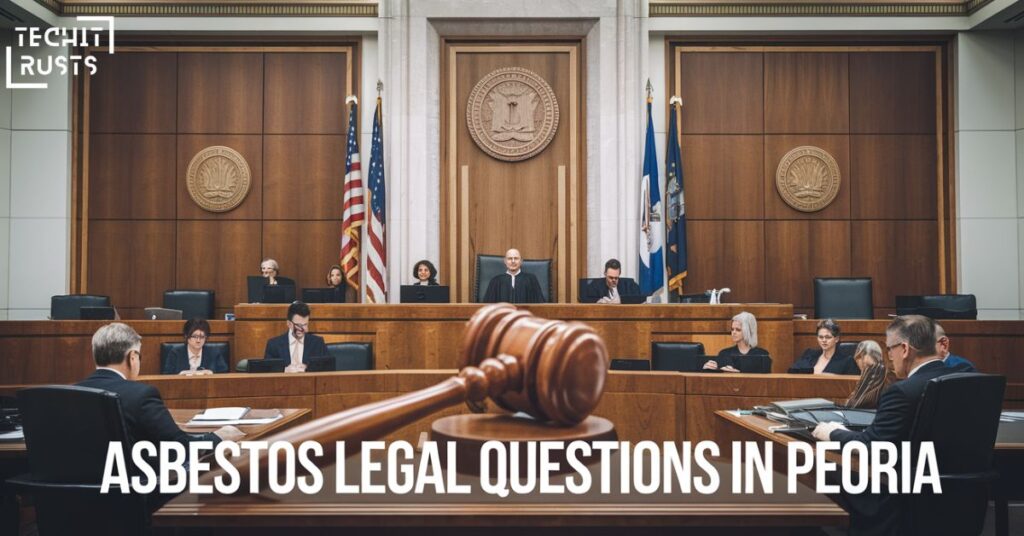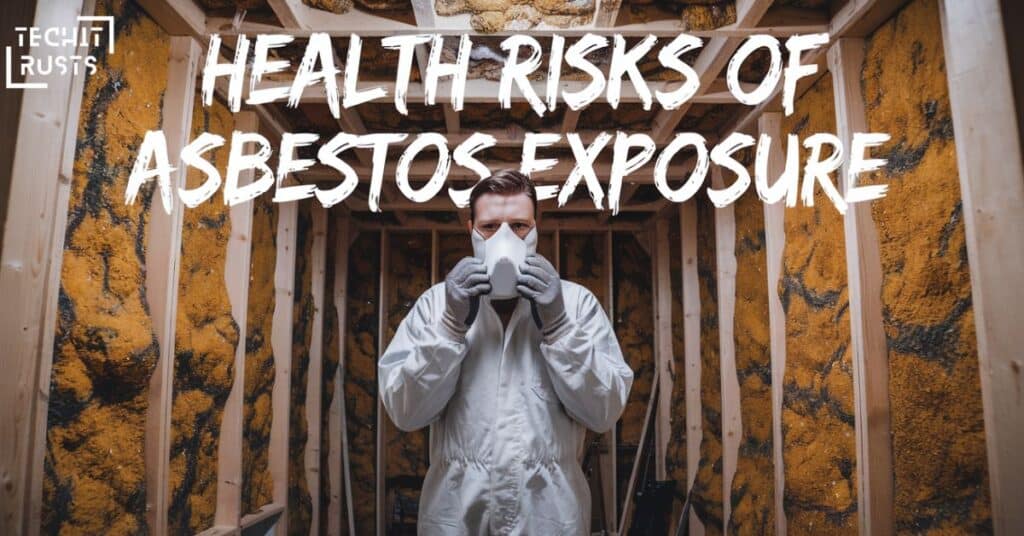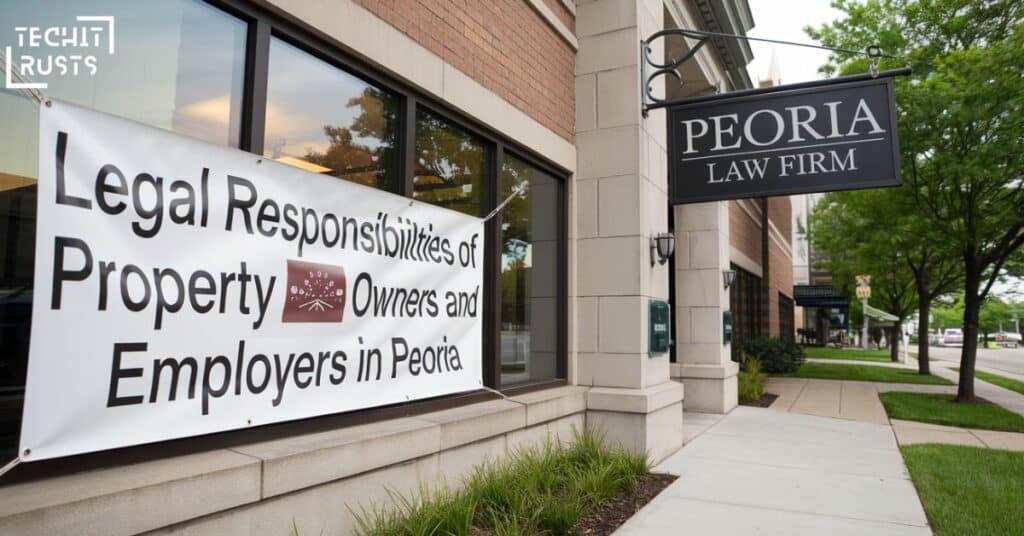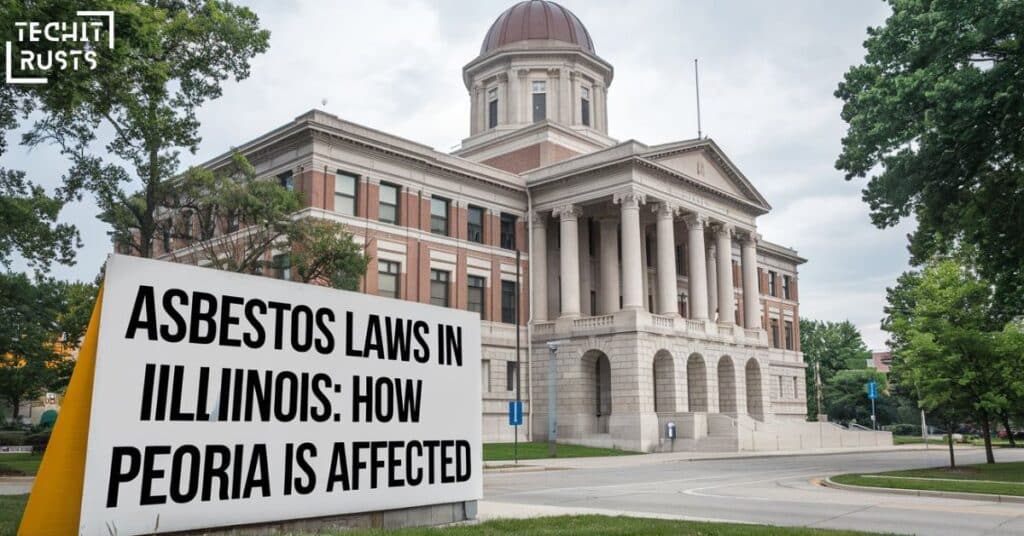Peoria, Illinois, has a long history as an industrial hub, with its roots deeply tied to manufacturing, construction, and the automobile industry. But along with its industrial past comes a dark legacy: Peoria asbestos legal questions surrounding exposure and liability. Asbestos in Peoria was widely used in the 20th century for its heat-resistant properties in industries that shaped Peoria’s economy.
Today, however, the presence of asbestos in homes, workplaces, and schools still poses significant Peoria asbestos legal risks and ongoing Peoria asbestos lawsuits related to health and safety concerns. If you live or work in Peoria, understanding the legal questions surrounding asbestos exposure is essential.
This comprehensive guide will break down everything you need to know, including the health risks, legal obligations of property owners, and how you can protect your legal rights if you or someone you love has been exposed to asbestos in Peoria.
Introduction: Asbestos Legal Questions in Peoria
Asbestos is a group of naturally occurring fibrous minerals that were once used extensively in building materials, industrial products, and even household items due to their fire-resistant and insulating properties. Unfortunately, these fibers are microscopic and, when disturbed, can become airborne and inhaled, leading to severe health issues, including mesothelioma, lung cancer, and asbestosis.

Peoria, Illinois, with its rich history in manufacturing, construction, and automotive production, has a significant number of older buildings and workplaces that still contain asbestos. As a result, residents and workers in the region may still face the risk of exposure today.
Moreover, many of the industries in Peoria that once used asbestos products have long since closed, leaving behind a legacy of asbestos-containing materials (ACMs) that are still present in old homes, schools, and industrial sites. If you are worried about asbestos exposure or suspect that you or someone you know may have been exposed to asbestos in Peoria, it’s crucial to understand your legal rights and the steps you need to take to protect yourself.
The Historical Presence of Asbestos in Peoria
Peoria has a long history with asbestos. The mineral was widely used in construction and manufacturing for its fire-resistant properties. Many buildings and factories in the area incorporated asbestos in their materials. This made them strong but also posed health risks. Workers and residents were often unaware of these dangers.
Over time, exposure to asbestos led to serious health issues. In the mid-20th century, concerns about asbestos grew. Lawsuits began as people fell ill from exposure. Local industries faced scrutiny for their use of asbestos. Efforts were made to remove it from buildings and protect public health.
Awareness campaigns helped inform the community about the risks. Today, Peoria continues to address the legacy of asbestos and its impact on residents.
Asbestos in Peoria’s Manufacturing Industry
The Peoria region has historically been a strong manufacturing hub, with many factories using asbestos-containing products in their day-to-day operations. Companies like Caterpillar Inc. and Peoria-based automotive plants used asbestos in a variety of ways:
- Caterpillar Inc.: As a major manufacturer of heavy machinery, Caterpillar used asbestos in brake pads, clutches, gaskets, and insulation materials. As a result, many workers who were exposed to these products developed asbestos-related diseases.
- Automotive Industry: In the early to mid-20th century, local automotive companies often used asbestos in brake linings, gaskets, and other engine components due to its heat resistance. Workers involved in the maintenance and manufacturing of these products were at significant risk of exposure.
Asbestos in Homes and Schools
Peoria’s residential areas also contain asbestos in older homes and buildings. Asbestos was a common material in the construction of homes and schools built before the 1980s, often used in:
- Roofing materials: Asbestos was used in roof shingles and siding materials due to its durability and resistance to weather.
- Insulation: Asbestos was used as an insulating material in attics, walls, pipes, and around boilers and heating systems.
- Floor and ceiling tiles: Many older floor tiles and ceiling tiles contained asbestos, as did some wall materials and plaster.
Given that Peoria has many historical homes and buildings, there is a real risk that these properties may still contain asbestos. Homeowners and workers in older buildings should be aware of the potential presence of asbestos and take steps to minimize their exposure.
Health Risks of Asbestos Exposure
Asbestos exposure can lead to severe health problems. The most notable diseases include asbestosis, lung cancer, and mesothelioma. Asbestosis is a chronic lung condition that causes breathing difficulties. It develops after long-term exposure to asbestos fibers.

Lung cancer can occur years after exposure, often without warning. Mesothelioma is a rare cancer linked directly to asbestos and affects the lining of the lungs. Symptoms of these conditions may take decades to appear. Common signs include persistent cough, chest pain, and shortness of breath.
Early detection is crucial for better treatment outcomes. If you suspect past exposure to asbestos, consult a healthcare professional. Protective measures and regulations have improved since the risks became known. However, awareness and vigilance remain essential for public health.
Mesothelioma: The Most Deadly Disease Linked to Asbestos
Mesothelioma is a rare and aggressive form of cancer that affects the lining of the lungs (pleura), abdomen (peritoneum), or the heart (pericardium). The disease is caused by the inhalation of asbestos fibers, which can lodge in the mesothelial cells lining the organs. Mesothelioma is almost always fatal and typically has a poor prognosis.
- Pleural Mesothelioma: This type affects the lungs and is the most common form of mesothelioma. The symptoms include chest pain, persistent cough, difficulty breathing, and fluid buildup in the lungs.
- Peritoneal Mesothelioma: This type affects the abdomen and may cause symptoms like abdominal pain, swelling, and nausea.
- Pericardial Mesothelioma: The rarest form of mesothelioma, affecting the lining of the heart. Symptoms may include irregular heart rhythms, chest pain, and fluid accumulation around the heart.
Sadly, mesothelioma has no cure, and the average survival rate after diagnosis is only 12 to 21 months.
Asbestosis: A Progressive Lung Disease
Asbestosis is another disease caused by inhaling asbestos fibers. Unlike mesothelioma, asbestosis is not cancerous but results in severe lung scarring. The disease typically progresses slowly and can cause symptoms like shortness of breath, chronic coughing, and chest pain.
Over time, asbestosis can lead to respiratory failure, and in severe cases, it may become life-threatening.
Lung Cancer
Asbestos exposure is also a leading cause of lung cancer. People who work in industries that used asbestos or live in homes with asbestos-containing materials are at increased risk of developing lung cancer, particularly if they smoke.
- Symptoms of Lung Cancer: These include coughing, wheezing, chest pain, weight loss, and shortness of breath. In some cases, the cancer may not be detected until it is in its advanced stages.
Other asbestos-related health conditions include pleural plaques (thickening of the lung lining) and pleuritis (inflammation of the lining of the lungs), which can indicate future health problems related to asbestos exposure.
Legal Responsibilities of Property Owners and Employers in Peoria
Property owners in Peoria have specific legal responsibilities regarding asbestos. They must ensure their buildings are safe for tenants and visitors. This includes conducting regular inspections for asbestos-containing materials. If asbestos is found, property owners must manage or remove it following local regulations. Failure to do so can lead to serious legal consequences.

They may face fines or lawsuits if individuals are harmed due to negligence.Employers also hold significant legal obligations related to asbestos exposure. They are required to provide a safe working environment for employees. This includes informing workers about asbestos risks and offering proper training.
Employers must implement safety measures, such as regular monitoring and protective equipment. If an employee develops an asbestos-related illness, the employer may be held liable for damages. Adhering to these legal responsibilities helps protect public health and ensures compliance with the law.
Responsibilities of Property Owners
Property owners in Peoria have legal obligations when it comes to managing asbestos in residential and commercial properties. These include:
- Conducting Asbestos Risk Assessments: If a building was constructed before the 1980s, property owners should conduct an asbestos inspection to determine whether asbestos is present. A qualified asbestos inspector should be hired to identify and assess any potential risks associated with asbestos-containing materials.
- Proper Management and Abatement: If asbestos is found in a property, the owner is responsible for ensuring it is safely removed or managed. In many cases, asbestos can be safely contained, but if removal is necessary, the property owner must hire a licensed asbestos abatement contractor to handle the removal and disposal.
- Notification: When asbestos is identified in a property, the owner must inform tenants, workers, and others who may be exposed to it. This is required by Illinois law to minimize exposure risks.
Employer Responsibilities
Employers in industries where asbestos is used or present must also take precautions to protect their employees from asbestos exposure. Employers must:
- Provide Safety Training: Workers must be trained on the risks of asbestos exposure and how to handle materials containing asbestos safely. Workers should also receive training on the proper use of personal protective equipment (PPE), such as respirators and protective clothing.
- Provide PPE: Workers who are exposed to asbestos must be provided with appropriate PPE, such as respirators and protective gear, to minimize the risk of inhaling asbestos fibers.
- Conduct Regular Asbestos Monitoring: Employers must regularly monitor the air quality in workplaces where asbestos is used to ensure that fiber levels remain below safe limits.
- Create an Asbestos Management Plan: Employers are required to develop a comprehensive asbestos management plan that outlines how asbestos will be handled safely. This plan must be available to all workers who may be exposed to asbestos.
Asbestos Laws in Illinois: How Peoria is Affected
Illinois has strict asbestos laws to protect public health, especially in Peoria. The state requires property owners and employers to follow specific regulations regarding asbestos management. These laws mandate inspections and assessments of buildings for asbestos-containing materials. In the Peoria Asbestos Legal Question, compliance with these regulations is crucial.

Local authorities monitor enforcement to ensure safety for residents and workers in Peoria, addressing any asbestos-related legal concerns effectively. Violations can result in significant fines and legal actions. In addition to state laws, federal regulations also impact Peoria. The Environmental Protection Agency (EPA) sets guidelines for asbestos handling and removal. Contractors must be certified to perform asbestos abatement.
These regulations aim to minimize exposure risks during renovations or demolitions. Peoria’s commitment to following these laws helps safeguard the community from asbestos-related health issues. Awareness and adherence to these legal frameworks are essential for protecting public health in the region.
Federal Asbestos Regulations
Several federal regulations govern how asbestos should be handled, including those set forth by the Environmental Protection Agency (EPA) and Occupational Safety and Health Administration (OSHA). These laws include:
- The Clean Air Act (CAA): The CAA regulates the release of airborne asbestos fibers during demolition and renovation activities. The EPA enforces these laws to reduce the risk of asbestos contamination in the air.
- The Asbestos Hazard Emergency Response Act (AHERA): AHERA requires schools to inspect for asbestos and develop a management plan to protect students and staff from exposure.
- OSHA’s Asbestos Standards for the Workplace: OSHA sets strict standards to limit exposure to asbestos in the workplace. Employers must comply with these standards to protect employees.
Illinois State Regulations
Illinois has its own set of asbestos-related regulations that complement federal laws, including the Illinois Environmental Protection Agency’s Asbestos Program. Some key points include:
- Asbestos Abatement Certification: In Illinois, any contractor working with asbestos must be properly certified by the state. They must also comply with state regulations regarding the safe removal and disposal of asbestos-containing materials.
- The Illinois Asbestos Abatement Act: This law sets the guidelines for asbestos abatement, including worker safety standards, handling procedures, and disposal requirements.
Common Asbestos Legal Questions in Peoria
Many residents in Peoria have questions about asbestos-related legal matters. One common question is, “What should I do if I suspect asbestos in my home?” Homeowners are advised to avoid disturbing the material and contact a licensed asbestos inspector. Professional assessment ensures safety and compliance with local regulations.

Another frequent inquiry is, “What are my rights if I was exposed to asbestos at work?” Individuals may be eligible for compensation if they develop health issues due to workplace exposure.People also often ask, “How do I file a lawsuit for asbestos-related diseases?” The process typically involves gathering medical records and proof of exposure.
Legal counsel experienced in asbestos litigation can provide guidance. Additionally, many wonder about the statute of limitations for filing claims in Illinois. In most cases, individuals have a limited time frame to file after diagnosis or discovery of exposure. Understanding these common legal questions is essential for those affected by asbestos in Peoria.
How Can You Identify Asbestos in Your Home or Workplace?
If you live or work in an older building, you should consider hiring a professional asbestos inspection service. An inspector can take samples and assess whether asbestos is present in your home or workplace. Common places to find asbestos include:
- Ceiling tiles
- Floor tiles
- Insulation
- Roofing shingles
- Plumbing pipes
What Are Your Legal Rights if Exposed to Asbestos in Peoria?
If you are exposed to asbestos in Peoria, you have specific legal rights designed to protect your health and well-being. First, you have the right to seek medical attention if you experience symptoms related to asbestos exposure. Early diagnosis can significantly improve treatment outcomes. You also have the right to receive information about the risks associated with asbestos in your workplace or home.
Employers and property owners are obligated to inform you about potential hazards.Additionally, you have the right to pursue compensation if you develop an asbestos-related disease. This can include filing a lawsuit against employers or property owners who failed to protect you from exposure. In Illinois, the statute of limitations allows you a specific timeframe to file a claim, usually starting from the date of diagnosis or discovery of exposure.
Consulting with an attorney who specializes in asbestos litigation can help you understand your rights and navigate the legal process effectively. It’s essential to act promptly to ensure your rights are fully protected.
Personal Injury Claims
If you develop an asbestos-related illness such as mesothelioma or asbestosis, you have the right to file a personal injury lawsuit against the responsible parties. This might include:
- Your employer (if you were exposed in the workplace).
- A property owner (if you were exposed while living or working in an old building).
- The manufacturer of the asbestos-containing products (if the asbestos came from a specific product).
Wrongful Death Claims
If a loved one dies as a result of an asbestos-related disease, you may be entitled to file a wrongful death claim. This can compensate for funeral costs, medical bills, and the emotional distress caused by the loss of a family member.
Frequently Asked Questions
Can Peoria tenants sue landlords for asbestos exposure?
Yes, tenants can file lawsuits against landlords for asbestos exposure, especially if the landlord failed to maintain a safe living environment. Illinois law holds property owners responsible for providing a habitable space free from known health hazards like asbestos.
What is the statute of limitations for asbestos claims in Peoria?
In Illinois, the statute of limitations for filing an asbestos personal injury claim is generally 2 years from the date of diagnosis of an asbestos-related illness. For wrongful death claims, it is typically 2 years from the date of death.
How long do asbestos lawsuits take in Peoria?
Asbestos lawsuits in Peoria can take anywhere from 1 to 3 years to resolve, depending on the complexity of the case and whether it goes to trial or settles out of court.
Conclusion
Asbestos remains a significant issue in Peoria, Illinois, and understanding the legal complexities surrounding asbestos exposure is critical. Whether you’re a resident, tenant, or worker, knowing your rights, understanding your health risks, and seeking the right legal help can protect you and your loved ones.
If you believe you have been exposed to asbestos in Peoria, seeking advice from an experienced asbestos attorney in Peoria is the first step toward getting the justice and compensation you deserve. Legal guidance can help you navigate the complexities of asbestos-related claims, from understanding your statute of limitations to determining which compensation options are available to you.
>>>Read Also: Understanding Your Charleston Mesothelioma Legal Question: Key Questions Answered

Ashi is the site admin for “techitrusts.com” and specializes in writing within the journal category. If you need more detailed information about his background or work, feel free to ask!